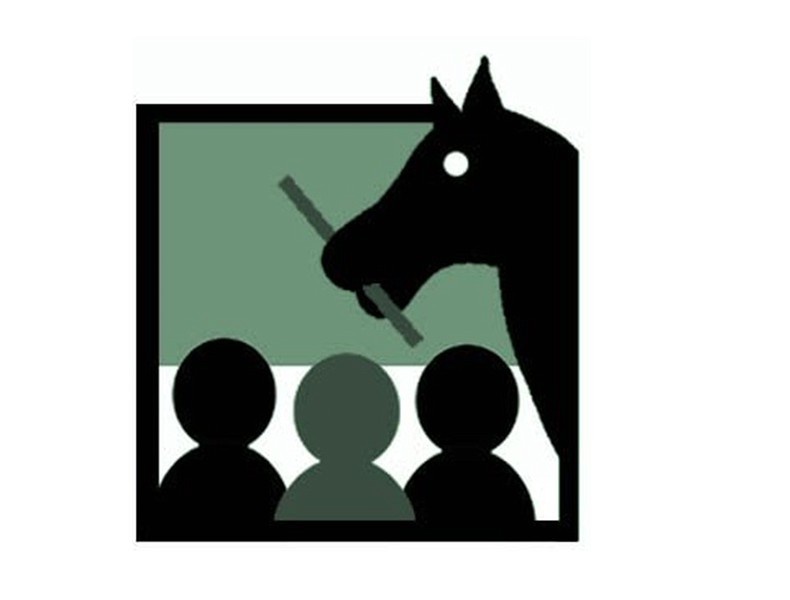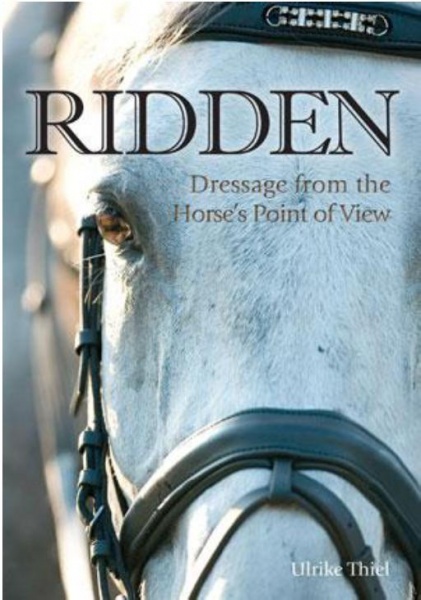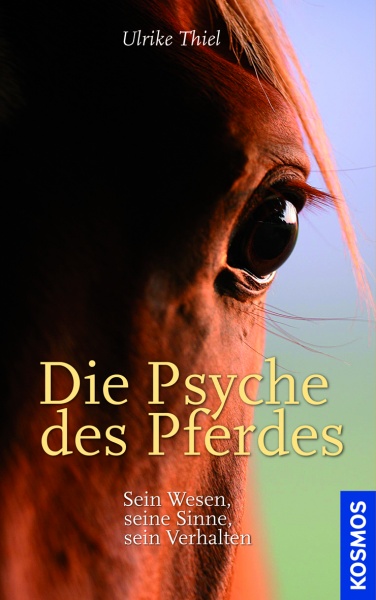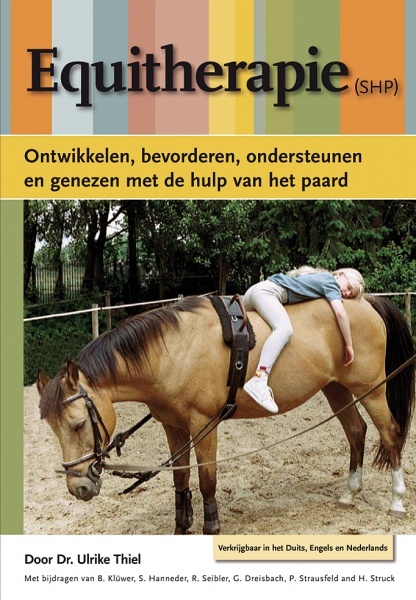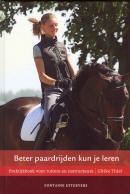Driedaagse workshop: Psychotherapie met het paard volgens de PMTV-methode.
Het paard als co-therapeut
Het is geen nieuws voor paardenliefhebbers, dat het omgaan met onze hippische partners voor ons vaak veel meer kan zijn dan alleen maar een sportieve of recreatieve bezigheid. Paarden kunnen goed aanvoelen wat er in ons omgaat en het contact en werken met hen kan ons helpen meer bij ons zelf te komen. Op deze manier kunnen paarden ook een sterke opvoedend effect op kinderen en de jeugd hebben. Deze fantastische mogelijkheden in de relatie van mens en paard kunnen ook gebruikt worden om de mens uit een aantal problemen te helpen of hem in zijn ontwikkeling te bevorderen. Dat paardrijden op verschillende manieren door gehandicapte mensen met veel plezier gedaan wordt is al jaren in Nederland bekend.
Bij het therapeutische paardrijden, Equitherapie, gaat het om het paardrijden en het contact en bewegen met het paard doelmatig te gebruiken, om therapeutische effecten te bereiken. Dit op lichamelijk maar ook psychisch vlak. Equitherapie houdt in, dat het paard met zijn specifieke sociale- leer- en bewegingsmogelijkheden meewerkt als "co-therapeut” om mensen (kinderen en volwassenen) met psychische en/of lichamelijke problemen systematisch te helpen of hen in hun ontwikkeling te bevorderen.
.Driedaagse workshop: Ook open voor deelnemers uit andere landen en daarom in de Duitse en Engelse taal
- Psychotherapie met het paard volgens de PMTV-methode
- 3 Tages-Seminar:Psychotherapie mit dem Pferd nach dem PMTV Modell
- 3 days seminar on PMTV working psychtherapeutically and pedagogically
(Psycho-motorisches Voltigieren – eine körperorientierte Form der Psychotherapie auf Basis der Pesso-Psychotherapie
PMTV, Psycho – Motorisch – Therapeutisch Voltigeren, is een lichaamsgerichte vorm van psychotherapie met het paard.
Hierbij wordt gebruik gemaakt van de therapeutische techniek van de Pesso-psychotherapie en zelfervaring met het paard via voltigeoefeningen en zelfervaringsoefeningen. Deze methode wordt sinds ruim 10 jaar op HippoCampus toegepast voor verschillende indicaties en werd ook op internationale schaal herhaaldelijk gepubliceerd. PMTV wordt ook geïntroduceerd tijdens de opleiding Equitherapie SHP-E(NL). Deze driedaagse workshop biedt Equitherapeuten SHP-E(NL), Reittherapeuten die binnen andere FATP-organisaties zijn opgeleid en psychotherapeuten, de mogelijkheid intensief kennis te maken met deze methodes.
Thema’s:
•De rol van het paard
•Verschillen en overeenkomsten tussen orthopedagogisch werken en psychotherapeutisch werken met het paard
•Diagnostiek en doelen
•De driehoekssituatie Therapeut – Cliënt – Paard
•Oefeningen en technieken
•De interventies door de therapeut
•Individuele supervisie en collegiale intervisie
•Zelfervaring met lichaamsgeoriënteerde technieken
Themen:
•Die Rolle des Pferdes
•Unterschiede und Gemeinsamkeiten zum HPV
•Diagnostik und Zielvorstellungen
•Die Dreiecksbeziehung Therapeut-Klient und Pferd
•Schaffen einer guten Possibility-Sfere
•Übungen und Techniken
•Die Therapeutenintervention
•Individuelle Supervision und kollegiale Intervision
•Selbsterfahrung mit körperorientierten Techniken
Programma: Er wordt Duits en Engels gesproken tijdens de workshop i.v.m. buitenlandse deelnemers)
1. Tag (Freitag)
Beginn 10 Uhr Ende 18. Uhr
Begrüssungsrunde und Kennenlernen der Teilnehmer und der Kursleitung
Formulierungen der Erwartungen und Einstimmung auf das Seminar
Rundgang über den Betrieb und Kennenlernen der Pferde und Übungsplätze
Was beinhaltet das PMTV Modell einer Psychotherapie mit dem Pferd?
Selbsterfahrung in Kleingruppen mit dem Pferd und Evaluation der wichtigsten Erlebnisse
Was macht eine gute Possibility Sphere aus?
Ausklang
2.Tag (Samstag)
Beginn 9.30 Ende 18 Uhr
nachher gemeinsames Abendessen möglich
Morgenrunde
Unterschiede und Gemeinsamkeiten zum HPV
Übungen und Therapeutenintervention
Praxis und Selbsterfahrung in Kleingruppen und Evaluation der wichtigsten Erlebnisse
Fortsetzung der Praxis mit körperorientierten Übungen
Evaluation der Übungen und Erfahrungen
Ausklang
3. Tag (Sonntag)
Beginn 9.30 Ende 17 Uhr
Die Dreiecksbeziehung Klient Pferd und Therapeut
Die Rolle des Pferdes im Prozess
Praktische Übungen am Pferd mit kollegialer intervision
Evaluation
Supervision
Rückblick auf die theoretischen und praktischen Themen, Diskussion
Abschlussrunde: die wichtigsten Erfahrungen dieser drei Tage
Ausklang
.Voor: Equitherapeuten, psychotherapeuten en equitherapeuten in opleiding
Geïnteresseerde Pesso therapeuten, Collega’s Equitherapeuten uit het buitenland
Prijs: zie Prijzenlijst
Data: zie Agenda
Tijd: vrijdag, zaterdag en zondag 9.30 - 19.00 uur
Locatie: Hippocampus
Consumpties: Koffie, thee, excl. lunch (in de pauze kan in het dorp geluncht worden) Zaterdag gezamenlijke maaltijd in de avonduren
Mee te brengen: Elastische broek, sportschoenen, regenjas, schrijfspullen
Studiemateriaal: Persoonlijk logboek, hand-outs
Werkwijze: Theorie, groeps- en individueel proces, zelfervaring met het paard en de werkwijze, intervisie en supervisieoefeningen
Uitgereikt wordt: Deelnamebevestiging, certificaat SHP-E(NL) Bijscholing
Registratie: Bijscholing (18 uur) Equitherapeuten SPH-E(NL)
.Psycho-motor therapeutic vaulting, (PMTV)
Based on remedial vaulting and Pesso-Boyden body oriented psychotherapy
3 days seminar on psychotherapeutic and pedagogical work with horses in the Netherlands
SHP-E(NL) in cooperation with HippoCampus Institute for Equitherapy and Equine Sport psychology Cranendonck The Netherlands
For mental health professionals and specialists in the field of equine facilitated therapy and therapeutic riding. with a background in psychotherapy with grown ups and juvenile clients. Pedagogically working equitherapists who want to meet another approach on fulfilling the developmental needs of their clients within the triangular situations with the horse
Program:
•Psychomotor vaulting – the basics
•PBSP theory of developmental an basic needs
•The role of the horse in PMTV
•The education of the horse in PMTV
•Differences and similarities to remedial vaulting
•Diagnostic and targets
•The triangular relationship horse therapist and client
•How to generate a good possibility sphere
•Exercises and techniques
•The intervention of the therapist
•The structure and different phases of the healing proces
•Individual supervision and intervision
•Self-reflexion and exercises with colleagues and the horses
The seminar language: English and German
Key presenters:
Dr. Ulrike Thiel Clinical psychologist, Educations: Riding/Vaulting Instructor, Instructor for Riding for the disabled (FENA BAFL) Remedial vaulting and riding (OEKTHR)
Client centred psychotherapy (Rogers) and Body-oriented psychotherapy (PBSP) President SHP-E(NL) ,
Head of the HippoCampus trainings centre (Institute for Equitherapy and Equine Sportpsychology)and Head of the training program for Equitherapists of SHP-E(NL)
In cooperation with a Pesso Therapist Instructor and training therapist in PBSP education (Vereniging van Pesso Psychotherapie NL)
Participation: 12 participants possible. (SHP-E(NL)) certificate.
Registration: Official form addressed to HippoCampus, de Bult 2 6027 RG Soerendonk The Netherlands, or hippocampus@iae.nl
Final registration date: Postmark ........ Fee: Seminar fee see price list. (Equitherapists SHP-E(NL) see price list) Final payment:........
If you need additional information or have questions, please contact
Dr.Ulrike Thiel HippoCampus De Bult 2, 6027 RG Soerendonk tel: 0031 (0) 495-45 37 57, GSM: 0031 (0) 6-51548351 e-mail: hippocampus@iae.nl homepage: www.hippocampus-nl.com
PMTV:– Psycho-Motor Therapeutic Vaulting
PMTV is a psychodynamic body-oriented form of psychotherapy based on remedial vaulting (Kroeger, 1977,1982,1990,1996,Kroeger et al. 1997) and psychomotor therapy PBSP (Pesso-Boyden System-Psychomotor Therapy) . This approach allows a wide range of applications for the most different indications from serious chronic psychiatric conditions to self-awareness groups (such as riders wishing to enhance their awareness and their relationship with horses). The aim of remedial vaulting is to integrate and unify the different active elements involved in therapeutic riding (horse, exercises, group…..) to achieve an ongoing developmental process. In working with adults, we have to bear in mind that participants have firmly entrenched personal histories they have learned to protect with their own mechanisms of defence and coping.
In contrast to remedial vaulting, PMTV takes place within a client-centred individual "triangle” formed by equitherapist, horse and client. Moreover, psycho-motor therapeutic vaulting is a process where interaction, response and projection need to be kept under control, i.e. it helps to structure the elements involved and to create systematically defined and varied therapy-based situations where clients feel safe to gather experiences in co-operation with the horse while being assisted by the therapist. The therapeutic programme relies on the Pesso-Boyden System/Psychomotor Therapy (PBSP) as a major treatment modality because it (1) is a development-oriented form of therapy, (2) structures the impulses clients experience during the process, (3) works with clear and targeted exercises, and (4) uses well-defined and safe situations for this purpose. In the "equine variant” of PBSP, the interaction between horse and client invites the latter to embark on a journey of self-discovery. Managed by the therapist, she/he may access unresolved past emotional conflicts through the instantaneous physical and emotional reactions that are triggered by exercises with and on the horse. Clients are made aware of these reactions, which are given names to make them less threatening. They are traced back to their origins and confronted within their historical context (such as previously unmet or inadequately met basic needs, past hurts, deprivations or losses).
Pesso Boyden System Psychomotor
is a comprehensive method of emotional re-education that applies successfully to a wide range of psychological and emotional problems. Its uniqueness lies in its capacity to help persons to: Symbolically satisfy their unmet developmental needs from early childhood — the needs for a sense of a place in the world, nurture, support, protection and limits. Offset the damage of traumatic events such as psychological, physical and sexual abuse. Undo the often unrecognized but powerfully experienced consequences of "Holes in Roles” -- fissures and fractures in family systems that one tries to fill by sacrificing a portion of their own psyche in the interest of completing the gestalt of an intact family network. The PBSP process of staging new, life-sustaining symbolic memories offsets the life-stifling consequences of deeply etched memories of damaging past events and enhances clients’ capacity to encounter and experience the present with more pleasure, satisfaction, meaning and connectedness. Further, these new memories, carefully created and installed as if they had happened in the actual past, tend to result in more optimistic anticipations of the future, thus promoting a happier, healthier state of being in the world.
A psychotherapy that facilitates essential human processes and the satisfaction of basic developmental needs that results in a life of meaning and pleasure. PBSP provides a time and space for "structures”, a symbolic re-enactment procedure that uses the resources of the body, mind and soul to fulfil the innate need to (1) become wholly and truly "who we are”(2) satisfy the basic developmental needs for place, nurture, support, protection and limits (3) integrate and unify the polarities of our biological and psychological being (4) develop our consciousness (5) develop our self-organising centre "pilot”(6) realise our personal uniqueness and potentiality. In Pesso-psychotherapy the approaches of psychoanalysis and family therapy converge, together with a client-centred attitude, in the one philosophy of treatment. This is coupled with a methodology based on the understanding of human physical and psychological development. Meaningful memories which influence our daily life are rooted in action, movement and bodily contact. In Pesso Psychotherapy clients are given the time and space to explore, within their own range of physical actions and experiences, the correlation between verbal and non-verbal language and between past an present. Posture and voluntary movement, physical symptoms and complaints bring the client in touch with psychological conflicts, unfulfilled needs and traumatic experiences. The body plays a key role in Pesso psychotherapy, providing the line of approach to help the client trace and process unresolved emotional conflicts. Instead of only discussing such conflicts, it allows the client to feel and express them physically and to look for a physically experienced, symbolic alternative.
<
25 jaar
HippoCampus
Horse & Human Development
Dat vieren wij met een aantal nieuwe aanbiedingen en daarom is de homepage op moment in editie.
Mocht u vragen hebben, dan neem contact met ons op via het reactie formulier
Share on Facebook

.jpg)
.jpg)
.jpg)
.jpg)
.jpg)
.jpg)
.jpg)
.jpg)
.jpg)
.jpg)
.jpg)
.jpg)
.jpg)
.jpg)
.jpg)
.jpg)
.jpg)
.jpg)
.jpg)
.jpg)
.jpg)
.jpg)
.jpg)
.jpg)
.jpg)
1.jpg)
.jpg)
.jpg)
.jpg)
.jpg)
.jpg)
.jpg)
.jpg)
.jpg)
.jpg)
.jpg)
.jpg)
.jpg)
.jpg)
.jpg)
.jpg)
1.jpg)
.jpg)
.jpg)
.jpg)
